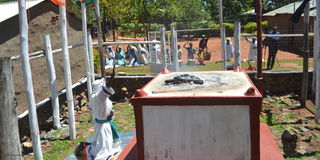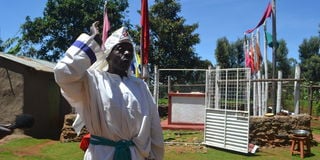We’re not a cult, Jehova Wanyonyi followers say; back crackdown

Followers of Jehovah Wanyonyi performing rituals and worship at the altar of burnt sacrifice at The Lost Israelites Church headquarters in Chemoroch village, Uasin Gishu county.
What you need to know:
jehovah Wanyonyi, whose real name was Michael Mwaboi, was born either in 1924 or 1925 in Bungoma County
In 1956, he started his sect that came to be known as the "Lost Israelites”
He claimed to be God and the biblical Jesus Christ his son. He claimed to be able to cure HIV and Aids
Wanyonyi is said to have had 70 wives, 95 children and several grandchildren
He is believed to have died on July 18, 2015
Nearly 10 years since the mysterious disappearance of the controversial self-proclaimed god Jehova Wanyonyi, followers of The Lost Israelites Church have insisted that they are not in a cult.
Through Chief Priest Eliabu Masinde, they insist that they are a genuine church registered by the government of Kenya in 1964.
Mr Masinde has dared the government to arrest them if they have evidence of the church being a cult.
“We are not a cult. Our church was genuinely registered by the government of Kenya in 1964. We worship our god Jehovah Wanyonyi and the government knows it.
Our belief is not against the government since we follow our constitution without infringing on the Constitution of our country,” said Mr Masinde.
Speaking at the church headquarters in Chemororoch village in Uasin Gishu county, Wanyonyi’s followers said they are not scared of the ongoing crackdown by the government on amorphous religious organisations.
“We support the proposal by the government to regulate churches. The move will tame rogue churches which are increasing in our country,” said Mr Masinde.
Investigate sect
Even as Mr Masinde defended his church, residents of Chemororoch village in Soy sub-county appealed to the government to investigate the church beliefs and activities, noting that since the mysterious disappearance of its leader Wanyonyi, they have been suspicious about the church’s operations.
“It is 10 years since Jehovah Wanyonyi died, and his followers have not disclosed what happened. Instead, they are lying to us that he did not die. We want the government to investigate them just like other churches,” said Mr Harun Rams Wekesa.
“If they want us to believe that Jehovah Wanyonyi was God, then they must present him to us alive, and if not, the government must close this church,” said Mr Wekesa.
His claims were disputed by the chief priest, who insisted that Jehovah Wanyonyi is still alive and that one day he will come back and take his followers to heaven.
“Those spreading rumours that Jehovah Wanyonyi died must stop it or else they will be cursed. Who told them that god dies?” he asked furiously.

Eliabu Masinde, the chief priest of the jehovah Wanyonyi sect near a sword believed to be a symbol of authority used by their ‘god’ Jehovah Wanyonyi at The Lost Israelites Church headquarters in Chemoroch village, Uasin Gishu county on May 14, 2023.
Mr Masinde denied claims that the membership of the church continues to shrink since the death of their leader, claiming that members are scattered throughout Western Kenya and Eastern Uganda.
“We have so many members spread across Western Kenya, West Pokot, and Eastern Uganda. Those spreading rumours that our population has declined are enemies of Jehovah Wanyonyi and soon the wrath of god will catch up with them,” he said as he pronounced curses on enemies of the church.
Born Michael Mwaboi
Jehovah Wanyonyi, whose real name was Michael Mwaboi, was born either in 1924 or 1925 in Bungoma County. In 1956, he started his sect that came to be known as the "Lost Israelites”.
He claimed to be God and the biblical Jesus Christ his son. He claimed to be able to cure HIV and Aids.
Wanyonyi is said to have had 70 wives, 95 children and several grandchildren.
He is believed to have died on July 18, 2015.
Currently, there are no reliable statistics about the number of his followers, but sources privy to his cult place the number at about 1,000 followers.
Ironically, the church’s chief priest praised the government for cracking the whip on Pastor Paul Mackenzie following the Shakahola tragedy, saying that characters such as Mackenzie must face the full rule of law.
Mr Mackenzie is the leader of the cult that urged followers to starve to death so they could go to heaven. More than 200 bodies have been exhumed from graves on his land in Shakahola, Kilifi County. The exhumations are still going on.
Mr Masinde accused Mr Mackenzie of claiming to perform miracles yet his church believes that the only person who can performs miracles is Jehovah Wanyonyi.
“The government must close all recently registered churches, including Mackenzie’s church, which are competing with Jehovah Wanyonyi by killing innocent Kenyans. Most of the modern churches are not genuine; they are only fighting Jehovah Wanyonyi,” he said.
'The late Kenyatta supported us'
Mr Masinde insisted that since the leadership of the first president of Kenya to date, the government knows of the operations of the Lost Israelites Church.
Mr Masinde warned police against interfering with the church’s operations.
“Our operations are genuine even the first president of this country, the late Kenyatta, knew our operations. The late president became a friend of this church when he took over from the British colony. The British colony warned Mr Kenyatta against fighting our church,” he claimed.
Mr Masinde also accused another church leader, Mr Eliud Wekesa, who calls himself Yesu wa (Jesus of) Tongaren of equating himself with God, as he praised the government's move to arrest him.
According to Mr Masinde, the only god to be worshipped is Jehovah Wanyonyi.
This comes after Mr Wekesa was detained by police pending investigations into operations of his church as the evaluation of religious organisations ordered by the government intensifies in the wake of the Shakahola tragedy.
The government has reiterated its commitment to eliminating religious leaders who misappropriate religious influence for hidden motives.





